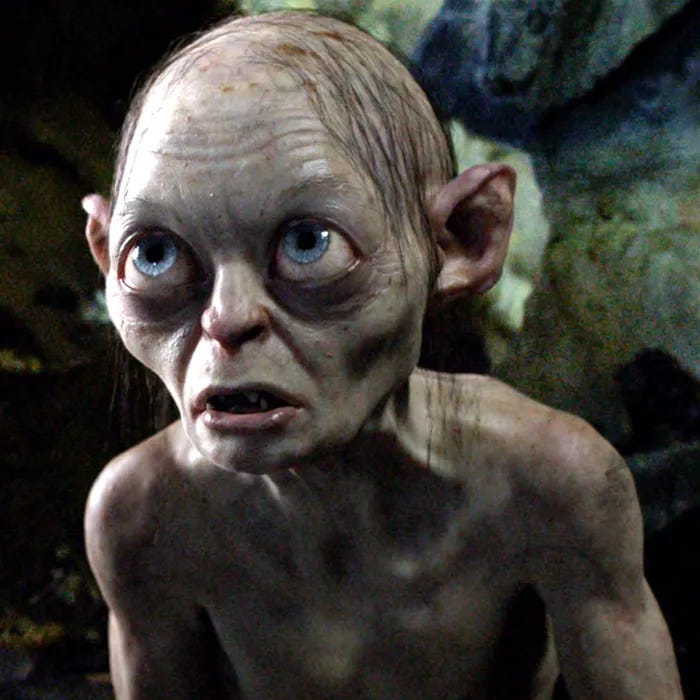The Shylock of the Lord of the Rings
Gollum won't be saved.
Readers of Lord of the Rings aren’t really supposed to root for Gollum. But if, like me, you’re Jewish, you might be tempted to cheer him on when he gets his teeth into the hand that feeds him, and bites down hard.
What does Gollum have to do with being Jewish, you ask? Well, he’s an antisemitic caricature.
Like stereotypical Jews, Gollum is driven by greed. And like stereotypical Jews, he is twisted, thin, and ugly, with distorted outsize facial features. Gollum hunched over the ring whispering, “my precious!” evokes grasping Jewish caricatures like Dracula in Stoker’s novel of that name, Fagin in Dickens, and fiendish, hunched Nazi caricatures.
The antisemitism here is in the tropes; Tolkien almost certainly didn’t intend Gollum to be an antisemitic statement. Some writers have suggested that the name Gollum is derived from the Jewish Golem. But since Gollum is nothing like the clay monster who comes to life, the argument isn’t very convincing.
Tolkien did explicitly identify Jewish stand-ins in his novels—but those stand-ins were the dwarves, not Gollum. In a radio interview, Tolkien linked the dwarves’ love of gold, and their dispersal across Middle Earth to Jewish people. He also in a letter said, “I do think of the ‘Dwarves’ like Jews: at once native and alien in their habitations, speaking the languages of the country, but with an accent due to their native tongue.”
Tolkien explicitly rejected the harsh antisemitism of the Nazis. But the fact that he racialized Jewish people by turning them into Dwarves, and the way he links Judaism and fascination with gold, suggests that he wasn’t immune to the British Christian antisemitism which was prevalent in his day as in ours. Gollum is a subhuman malevolent embodiment of avarice. And in Western Christian culture, when you’ve got a subhuman malevolent embodiment of avarice, you’re going to channel antisemitism unless you’re very careful.
In this context, the relationship between Frodo and Gollum takes on a queasy resonance. Frodo is a fairly obvious Christ figure, who suffers torment as Ring-Bearer in order to save the world. His growing Christ-like wisdom and Christ-like mercy is expressed through his compassionate treatment of Gollum, the greedy monster who wants to kill him and steal the ring.
“Maybe he does deserve to die, but now that I see him I do pity him," Frodo says in The Two Towers, and when Sam wants to finish Gollum off, Frodo insists on sparing him and traveling with him. Even when Gollum betrays Frodo, bites his ring finger off, and falls into the fire, the hobbit preaches kindness. “I could not have destroyed the Ring. The Quest would have been in vain, even at the bitter end. So let us forgive him!”
This is supposed to show Frodo’s essential goodness. But it’s inflected a little differently if we recognize Gollum as a Jewish caricature. Suddenly Frodo’s forbearance looks more like condescension. Is Frodo treating Gollum well out of humane nobility? Or is Frodo’s nobility, and indeed his humanity, leached out of Gollum, who is diminished, humiliated, and ultimately killed to preserve Frodo’s status as virtuous master?
The Ring corrupted Frodo, so he was unwilling to destroy it and claimed it for himself. Then Gollum attacked him, bit off his finger, and fell into the pit. Frodo’s greed and evil is (fairly literally) eaten by Gollum, just as Christian’s projected their own greed onto the Jewish people they frequently and even systematically robbed.
Gollum understandably resents being a vessel for Christian guilt and Christian self-aggrandizement. And he reacts as many oppressed people have—by displaying a kind of double-consciousness. He vacillates between abasing himself before Frodo and plotting against him—acquiescing to the ideology of Christian superiority and plotting to overthrow it.
Sam refers to these two sides of Gollum as “Stinker” and “Slinker.” They correspond neatly to the stereotypes which frame Jewish people as either weak-willed, inauthentic assimilationists or vicious, treacherous outsiders. Gollum can acquiesce or he can resist, but either way he is framed by his quasi-Christian rulers as evil and outside the circle of salvation.
If you’re a Tolkien skeptic, this Gollum’s-eye view of the narrative is rather damning. But just as Shakespeare gives Shylock a soul, so does Tolkien to some degree urge you to put yourself in Smeagol’s scrawny, rubbery skin.
Gollum is one of Tolkien’s most riveting and charismatic creations. Andy Serkis’ motion capture CGI conversations with himself as Stinker vs. Slinker are among the films’ absolute high points. When you have to choose between a bitter, aggressive Sam and the wide-eyed, miserable Gollum, what reader hasn’t for a moment or two been Gollum, satisfyingly getting his long fingers around that mean hobbit throat?
Recognizing Gollum’s Jewishness highlights some of the unfortunate stereotypes underpinning Tolkien’s Christian imagination. But it also opens that imagination up to counter-readings and to counter-heroes. Gollum never believed the one ring should rule over him. Even on the edge of the abyss, he believed in his own value. The world and Middle Earth tell them otherwise, but the despised and defeated, like Gollum, know they are precious.


